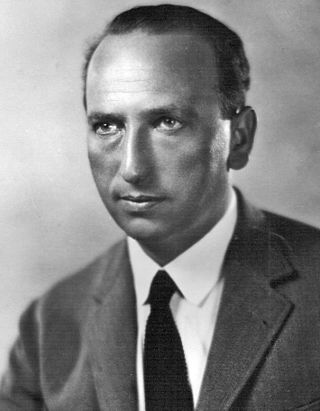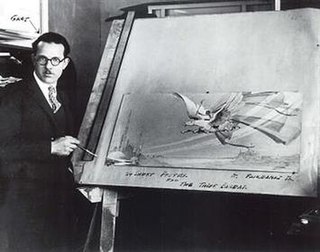Related Research Articles

Michael Curtiz was a Hungarian-American film director, recognized as one of the most prolific directors in history. He directed classic films from the silent era and numerous others during Hollywood's Golden Age, when the studio system was prevalent.

Berkeley William Enos, known professionally as Busby Berkeley, was an American film director and musical choreographer. Berkeley devised elaborate musical production numbers that often involved complex geometric patterns. Berkeley's works used large numbers of showgirls and props as fantasy elements in kaleidoscopic on-screen performances.

Orry-Kelly was the professional name of Orry George Kelly, an Australian-American Hollywood costume designer. Until being overtaken by Catherine Martin in 2014, he was the most prolific Australian-born Oscar winner, having won three Academy Awards for Best Costume Design.
Heinz Roemheld was an American composer.

Leo White, was a German-born British-American film and stage actor who appeared as a character actor in many Charlie Chaplin films.

Charles Henry Pywell Daniell was an English actor who had a long career in the United States on stage and in cinema. He came to prominence for his portrayal of villainous roles in films such as Camille (1936), The Great Dictator (1940), Holiday (1938) and The Sea Hawk (1940). Daniell was given few opportunities to play sympathetic or 'good guy' roles; an exception was his portrayal of Franz Liszt in the biographical film of Robert and Clara Schumann, Song of Love (1947). His name is sometimes spelled "Daniel".

Walter Leland Catlett was an American actor and comedian. He made a career of playing excitable, meddlesome, temperamental, and officious blowhards.

Hugh Herbert was an American motion picture comedian. He began his career in vaudeville and wrote more than 150 plays and sketches.

Minor Watson was a prominent character actor. He appeared in 111 movies made between 1913 and 1956. His credits included Boys Town (1938), Yankee Doodle Dandy (1942), Kings Row (1942), Guadalcanal Diary (1943), Bewitched (1945), The Virginian (1946), and The Jackie Robinson Story (1950)

Wallis Hensman Clark was an English stage and film actor.

William Beatman Davidson was an American film actor. He appeared in more than 300 films between 1915 and 1947.
Leo Frank Forbstein was an American film musical director and orchestra conductor who worked on more than 550 projects during a twenty-year period.

Jack Mower was an American film actor. He appeared in more than 520 films between 1914 and 1965. He was born in Honolulu and died in Hollywood.
Ray Enright was an American film director. He directed 73 films between 1927–53, many of them for Warner Bros. He oversaw comedy films like Joe E. Brown vehicles, five of the six informal pairings of Joan Blondell and Glenda Farrell, and later directed a number of Westerns, many featuring Randolph Scott. Enright was born in Anderson, Indiana. He served in the U.S. Army Signal Corps in France during the First World War. Enright died in Hollywood, California, from a heart attack.

Anton Grot was a Polish art director long active in Hollywood. He was known for his prolific output with Warner Brothers, contributing, in such films as Little Caesar (1931), and Gold Diggers of 1933 to the distinctive Warners look. According to a TCM profile, he showed a "flair for harsh realism, Expressionistic horror and ornate romantic moods alike".
Max Parker was an American art director. He was nominated for an Academy Award in the category Best Art Direction for the film George Washington Slept Here. He worked on 86 films between 1916 and 1947. He was born in Prescott, Arizona, and died in Torrance, California.

Eddie Kane was an American actor who appeared in over 250 productions from 1928 to 1959.
Nathan Levinson was an American sound engineer. He won an Oscar in the category Sound Recording for the film Yankee Doodle Dandy and was nominated for 16 more in the same category. He was also nominated seven times in the category Best Special Effects.
Fred Santley, also known variously as Freddie Santley, Fredric Santley, Frederick Santley, Frederic Santley, and Fredric M. Santley, was an American character actor of the silent and sound film eras, as well as an actor on the Broadway stage.

John Sheehan was an American actor and vaudeville performer. After acting onstage and in vaudeville for several years, Sheehan began making films in 1914, starring in a number of short films. From 1914 to 1916, he appeared in over 60 films, the vast majority of them film shorts.
References
- ↑ "The 16th Academy Awards (1944) Nominees and Winners". oscars.org. Retrieved June 4, 2019.